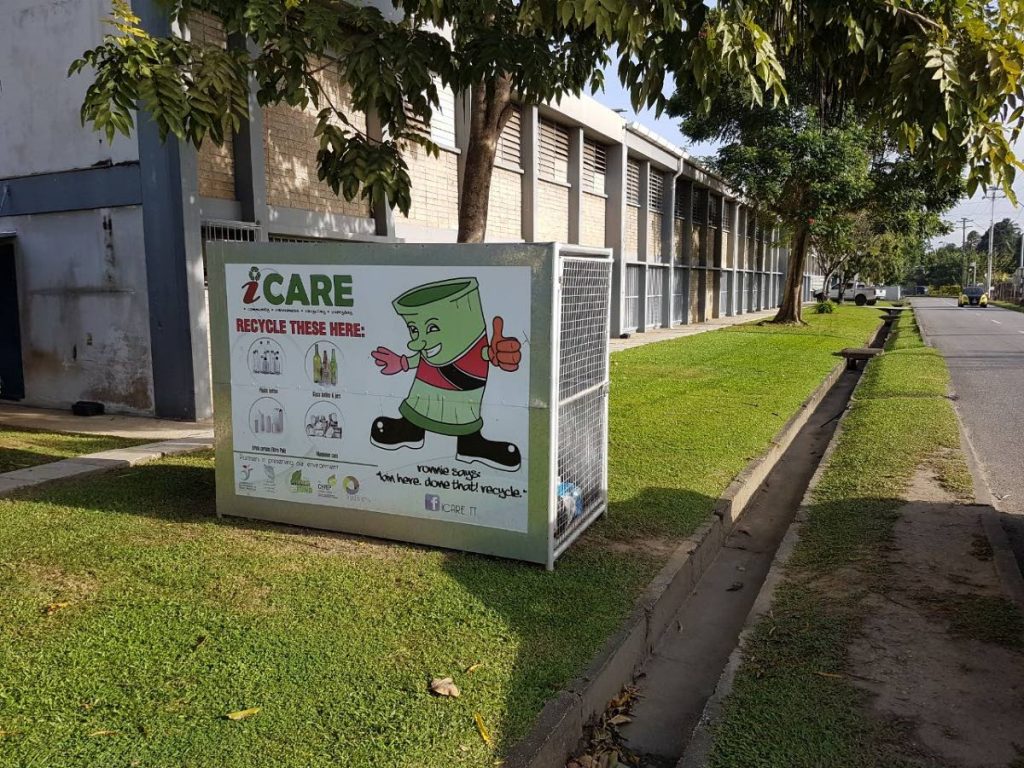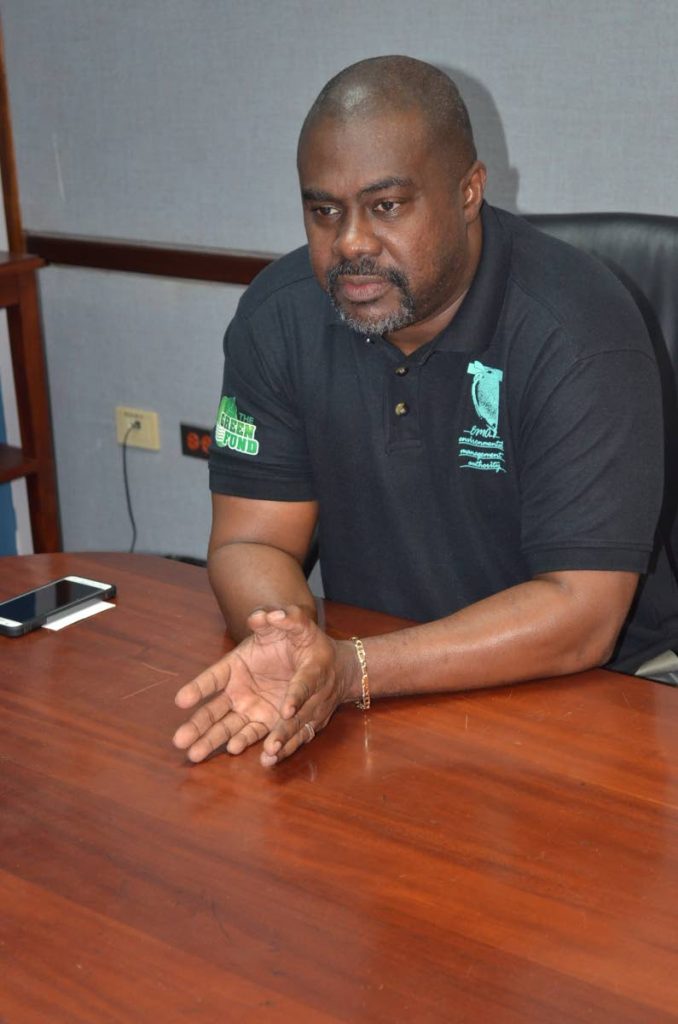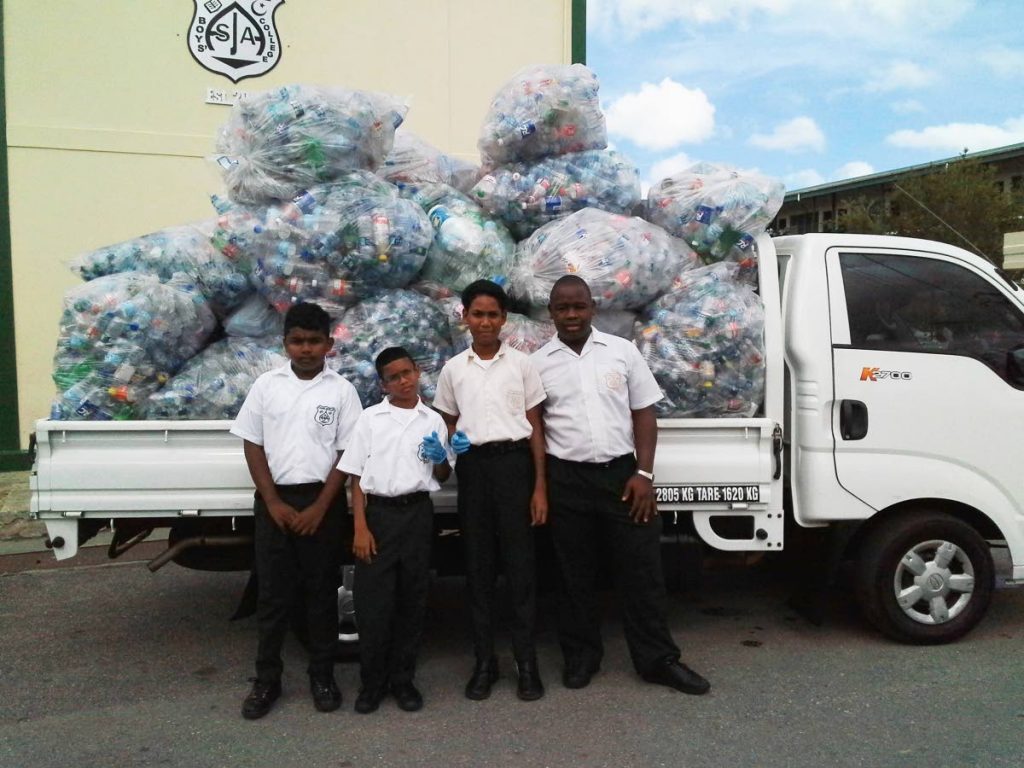Next generation to benefit as TT bids to become Recycling hub

The Environmental Management Authority (EMA) is seeking to build a recycling culture that would lead the country to become a Caribbean hub for recyclables, to the benefit of the next generation.
This is the view of Dale Cozier, senior project manager of iCARE (Community, Awareness, Recycle, Everyday). He spoke about the project with Business Day at the EMA’s offices in Woodbrook.
The project is phase two of the Beverage Containers Cleanup Project and is aimed at encouraging recycling across TT to reduce the amount of solid waste being sent to already overburdened landfills.
Cozier reported the project began in June 2015 under the People’s Partnership and fairly close to the general elections. The project then transitioned to the People’s National Movement government in September. Cozier explained the EMA did not have a board from September 2015 to July 2016 and was not entering into contracts or awarding purchase orders more than $30,000. This situation left the iCARE project hamstrung and they therefore did not push it in the public domain.
During that period, the EMA focused on collection and in September 2016 began pushing the project again. Cozier said the focus is the establishment of the infrastructure for recycling distinct from any other programme.
The project focuses mainly on beverage containers, namely plastic drink bottles made from polyethylene terephthalate or PET, aluminium cans, glass bottles and Tetra Paks. The EMA is also looking at getting involved in the infrastructure for electronic waste collection and recycling.
Cozier said more than 80 bins will be placed at 70 locations. The bins are currently located in ten schools and this year collection sites are to be set up at all primary and secondary schools and an education programme is also planned.

He said people believe recycling is a “money making thing” but this is only possible if there is a bottle refund.
“If the individual bottles have value or there is a tipping fee at the landfill and the other recycling facilities that is where they make the money. The selling of recyclables is not as profitable as people think it is.”
The challenge in Trinidad, he said, is there are only a few people who bail or shred plastic for export such as Recycling in Motion and Recycling Waste and Logistics. These companies export recyclables, mainly plastics, and they are small operators that only deal with sorted material.
Cozier said for a recycling industry to be established there must be infrastructure and the project has been establishing depots in Trinidad and is looking to expand into Tobago. So far, there are three of five planned depots at Namdevco in Sea Lots, Guanapo Landfill and Forres Park Landfill.
Cozier said the Solid Waste Management Co Ltd (SWMCOL) has an expression of interest out for private sector partnerships on depots. He said the bottles collected by Plastikeep, which is on the verge of being shut down due to lack of funding from the Green Fund, are taken to SWMCOL and the processing is paid for by iCARE.
There is also a plan to partner with local government agencies for collection in some areas and private contractors in others, and for the Public Utilities Ministry to implement recycling programmes in government buildings. Cozier said the EMA is looking to partner with the oil and gas sector and companies with STOW (Safe To Work) certification which includes the need to have a chain of custody for waste and how much is generated, where it is going and what is done with it.
“We are looking to partner with everybody.”
Initially most of the material will be exported because there are not enough local industries to take in the recyclables. The EMA wants to work with entrepreneurs in Trinidad who want to convert recyclables into something useful. Cozier pointed out one organisation is looking to create plastic lumber and another is looking at shredding plastic and sequestering it in concrete to make park benches and stepping stones for yards. He said many people are interested in recycling including entities looking at composting on a commercial scale and at converting plastic to fuel.
Cozier said recyclables only have value when it meets certain specifications and clean plastics must be processed from their collection sites to be shipped overseas to earn foreign exchange or to be utilised locally in high-end industries.

He said since the bins were implemented there has been a positive response and requests for new bins from the private sector and communities. So far, the project has collected more than 370,000 jumbo bags of material. At the time of the interview, the plastic and aluminium were still to be weighed. Cozier said the project was meant to test the waters and reiterated it is meant to establish infrastructure. The EMA will partner with the Institute of Marine Affairs for data collection and analysis. They are expecting to have enough information for private sector interests to use in their business plan and see what aspect of the industry they want to be a part of.
Cozier said waste rules legislation is key to the process and the EMA is looking to submit the waste rules to Parliament and then for public consultations in the first half of the year. The rules will change things in Trinidad dramatically, he said, as all non-hazardous waste will have to weighed before leaving a business compound and categorised.
Waste that has recyclable value cannot be taken to landfill but has to go to a recycler or a facility, Cozier explained. The draft states if a company does not take its waste to a recycler or a facility the landfill has a right to refuse it. If the landfill chooses to take the waste it will charge a fee and this the deterrent factor.
“And that is why our programme is so critical. We need to establish the infrastructure so that when the rules are passed, waste generators have the facilities that they can take the different types of waste to, whether it is organic waste whether paper, plastic or aluminium.”
Cozier said with the rules the generators can only work with registered waste haulers and there is a chain of custody of the waste. This will reduce illegal dumping and when facilities are at full capacity it will encourage the private sector to provide solutions to recycling commodities in Trinidad. This will also help to reduce the carbon footprint, as waste going to landfills would be reduced, and recyclables would be converted into useful products that can provide an economic benefit, and this is preferable to exporting via a boat which gives off carbon dioxide.
He pointed out that recycling is only one of the “Rs” together with reduce, reuse and recover.
The waste rules, however, would not cover households and the EMA is willing to partner with any corporation that wants to establish curbside collection.
Another programme, and one that incorporates technology, is reverse vending machines where someone can insert a bottle, get it scanned and receive a ticket for the value to cash in. These machines are to be implemented in the first half of the year.
Cozier said this country has started from zero and the US, which started 50 years ago, only has an about 35 per cent recycling rate. He stressed recycling is an industry and has to be profitable to be sustainable. He believed that once the data is available the private sector would take establish minor collection points in the country. In 2020, iCARE comes to an end and if the data is inconclusive and the private sector wants more it would be extended. He said currently no one can say definitely how much waste is generated.
One of the things being discussed is for Trinidad to become a hub for recyclable resources from other Caribbean islands. He pointed out this country still has access to cheap energy and such an arrangement would mean economies of scale as the islands would serve as collection points.
It is a long term plan and Cozier predicted it would take a generation to really reap the benefit.
“Changing the culture will take at least a generation.”


Comments
"Next generation to benefit as TT bids to become Recycling hub"